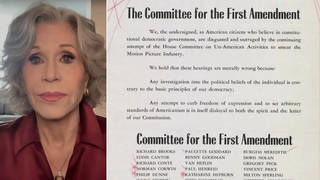
Guests
- Davin Rosboroughsenior staff attorney with the ACLU Voting Rights Project.
- Tish Gotell Faulkslegal director at the ACLU of Alabama.
- Khadidah Stonechief field and campaign strategist at Alabama Forward and one of the named plaintiffs in Allen v. Milligan, the Supreme Court case about redistricting in Alabama.
In a surprise 5-4 decision Tuesday, the U.S. Supreme Court rejected a racially gerrymandered voting map in Alabama, upholding a key plank of the Voting Rights Act that the conservative majority has spent years whittling away at. Chief Justice John Roberts and Justice Brett Kavanaugh sided with the court’s liberal justices in finding that Alabama’s Republican-drawn congressional districts unlawfully disadvantage Black voters by diluting their voting power, a violation of Section 2 of the Voting Rights Act banning voting practices that discriminate based on race and color. The court ordered Alabama’s Legislature to redraw the map. For more on the decision and the state of voting rights across the country, we are joined by three guests: Khadidah Stone is a named plaintiff in the case and works for the civic engagement organization Alabama Forward; Tish Gotell Faulks is legal director at the ACLU of Alabama; and Davin Rosborough is a senior staff attorney with the ACLU Voting Rights Project who helped represent the plaintiffs.
Transcript
AMY GOODMAN: This is Democracy Now!, democracynow.org, The War and Peace Report. I’m Amy Goodman, with Juan González, as we turn now to a surprise decision by the U.S. Supreme Court that upheld the Voting Rights Act and rejected a racially gerrymandered voting map in Alabama. This is how Democratic Congressmember Terri Sewell of Alabama responded.
REP. TERRI SEWELL: Wow! The Supreme Court just upheld the protections of the Voting Rights Act of 1965 in ordering the state of Alabama to redraw its congressional maps. What an amazing victory, a victory not only for Alabama Black voters, but a victory for democracy itself.
AMY GOODMAN: In a 5-to-4 ruling, Chief Justice Roberts and Justice Brett Kavanaugh sided with the court’s liberal justices in finding Alabama’s Republican-drawn congressional districts unlawfully disadvantage Black voters — a violation of Section 2 of the Voting Rights Act, which bars voting practices that discriminate based on race or color.
Plaintiffs argued the map packed and cracked voters in Alabama’s so-called Black Belt by crowding many of them into a single district and dispersing the rest into several other districts. The result was that despite the state having a Black population greater than 25%, just one of its seven congressional districts was minority majority. The court ordered Alabama’s Legislature to redraw the map so there will be two.
When Chief Justice Roberts worked in the Justice Department and White House Counsel’s Office during the Reagan administration, documents show he was critical of the Voting Rights Act. But in his opinion Thursday, he said, quote, “We find Alabama’s new approach to §2 compelling neither in theory nor in practice.”
Meanwhile, Justice Clarence Thomas wrote a 48-page dissent and called the case “yet another installment in the disastrous misadventure of this Court’s voting rights jurisprudence.”
For more, we’re joined by three guests. In Montgomery, Alabama, Khadidah Stone is the chief field and campaign strategist at Alabama Forward. She was one of the named plaintiffs in the case. Also in Montgomery, Tish Gotell Faulks, legal director at the ACLU of Alabama. And with us, Davin Rosborough. He is senior staff attorney with the ACLU Voting Rights Project, one of several attorneys who represented the plaintiffs, part of that team before the Supreme Court.
We welcome you all to Democracy Now! Davin, let’s begin with you. The significance of this decision, and why so many experts were shocked that Roberts and Kavanaugh joined with the liberal justices in demanding that the gerrymandered districts in Alabama be redrawn?
DAVIN ROSBOROUGH: Yeah. Thank you so much for having me.
This is a really significant decision. And I think there is some surprise in the media and in the general public because of the direction the court has been going, particularly regarding race and the Voting Rights Act and voting.
But I think what happened here was a majority of the court was compelled by some really clear text and purpose of what Congress did when it amended the Voting Rights Act in 1982, and then the compelling facts of this case, that this was an incredibly clear violation. If this wasn’t a violation of the Voting Rights Act, it was hard to imagine what could have been. So, I think, hopefully, the combination of looking at what Congress intended and the purpose of the Voting Rights Act and the incredibly compelling facts put forward in our case really pushed those justices to find for us.
JUAN GONZÁLEZ: And, Davin Rosborough, I wanted to ask you about the history of Alabama in repeatedly violating the Voting Rights Act over many years, and what was different in this particular case.
DAVIN ROSBOROUGH: Yeah, that’s right. In a lot of the most famous cases, voting cases, to come before the Supreme Court, unfortunately, many of them have come out of Alabama. And Alabama’s own arguments basically acknowledged the roots of this map. What they said was their congressional map has largely been the same since the early 1970s. And, of course, in the early 1970s, George Wallace was still governor. Alabama was head-on fighting the Voting Rights Act and integration and all that sort of thing. The one district that gave Black voters in Alabama the opportunity to elect candidates of choice only came about also through litigation, and that wasn’t until the early ’90s. And even then, that created, sort of carved out one district, but Alabama continued to rely on that and not look at the changing demographics, the continuing presence of very polarized voting based on race, continuing discrimination, and effects of discrimination, and continued to try to double down on the status quo.
But that’s not what was required here. And I think, really, all of the different factors that the court is supposed to look at to determine whether there’s a violation — you know, whether another reasonably configured district can be drawn, whether race already completely infuses the political system, and whether the maps are being used in a way that takes advantage of that ongoing discrimination across multiple sectors — those were all present here, and they were present in droves. And I think that really compelled the district court’s findings here, and then the majority of the Supreme Court to affirm that.
AMY GOODMAN: I want to bring Tish Gotell Faulks into this conversation. She is also with the ACLU. She is the legal director at the ACLU of Alabama, joining us from Montgomery. Were you surprised by this decision, and particularly that Chief Justice Roberts and Kavanaugh both voted with the liberal majority? And what this now means in Alabama, going back to the drawing boards, and for other states? This doesn’t just now affect Alabama, because it sets precedent.
TISH GOTELL FAULKS: Good morning, and thank you for having us.
We were not surprised here in Alabama. We had a great deal of faith and confidence that the structure of Section 2 would demonstrate that Alabama had failed once again to meet their constitutional obligations. We were deeply concerned that we would get a new test from the court.
But what we saw here was the United States Supreme Court giving a full-throated rejection of Alabama’s suggestion that we are now at a point in history where we can move on from the racist past in how Black voters were treated. This litigation was intended to ensure that the voices of Black voters, that the voices of those who believe Alabama should move in a different direction, that those voices are heard. And we are just thrilled that the rest of the country now gets to see the power of people and movement.
JUAN GONZÁLEZ: And, Tish Gotell Faulks, what about those who say that this ruling only preserves the status quo, it doesn’t really expand the protections of the Voting Rights Act, especially vis-à-vis the decisions of prior years that have reduced its influence and power?
TISH GOTELL FAULKS: Well, I think what’s important here is the court’s recognition that Congress has an important role to play in updating old law to meet the new challenges of the day. And, in fact, this court has shown a great deal of restraint in allowing the structure of analysis to remain in place. The court underscored that this has been the way to do this analysis for dozens of years, and that they see nothing in the legislative record that would suggest that they need to change course. What we know we need is an update to the Voting Rights Act. And this court seems to be signaling Congress that if there are changes to be made, it is Congress’s responsibility to do so.
We stand ready here in Alabama to send representatives that are going to reflect the true beliefs and needs of the people of Alabama. And today the Supreme Court has said that must include fair opportunity for Black voters to have the candidate of their choice, as well. And we are thrilled about that.
AMY GOODMAN: Khadidah Stone is also with us in Montgomery, chief field and campaign strategist at Alabama Forward, most significantly right now, one of the named plaintiffs in the Supreme Court case about redistricting in Alabama called Allen v. Milligan. Khadidah, if you can talk about why you came forward to sue around this issue of gerrymandering?
KHADIDAH STONE: Yeah. First, I want to say thank you so much for having me. It’s an honor.
But I think a main reason why I decided to sue was just because I saw a lot of unfairness going on. And it’s kind of one of those situations where it’s like if no one else will do it, who will? And so, that’s why decided to be a part of this case and take it on. And I’m so glad that I was given the opportunity to do so alongside my amazing co-plaintiffs and our amazing legal team.
JUAN GONZÁLEZ: And could you talk about the impact that this ruling will have on the work you do in Alabama, and what you hope and expect that the Alabama Legislature will now do?
KHADIDAH STONE: I would hope and expect the Alabama Legislature will go back and really take into account the needs of the community and the ways that they have expressed themselves, when drawing these maps. I think that’s the most important. But also, listening to the Supreme Court. They said to redraw the map in a fair and equitable way, so I would hope that our Legislature will do that and do right by Alabamians.
AMY GOODMAN: And bringing Tish back into the conversation, Tish Gotell Faulks, what this means for other states all over the country, and particularly in the South, where you are? I mean, we’re talking about a redistricting of a map that could lead to the changing of the parties in Congress, who controls Congress.
TISH GOTELL FAULKS: Well, we know that, aside from Alabama, Louisiana also had a successful gerrymandering challenge. And, of course, we are expecting that the ripples of this opinion will be felt in the next election cycle and through the rest of the decade. I think that this is a moment for the partisan parts of our government to court voters to their policy preference. We know that it should not be that elected officials select who they represent, that the people should be empowered to select their representative. Across the South, I think this is going to be important, but this will also have an impact in the Southwest, in the Midwest, and perhaps all over the country. But this success, this is a victory for representative democracy, and that is what we want to ensure remains.
AMY GOODMAN: Tish Gotell Faulks, I want thank you for being with us, legal director at the ACLU of Alabama; David Rosborough, attorney with the ACLU Voting Rights Project, one of the attorneys who represented the plaintiffs before the Supreme Court; and Khadidah Stone, chief field and campaign strategist at Alabama Forward, one of the named plaintiffs in the case.
Coming up, Omali Yeshitela joins us, chair of the African People’s Socialist Party. He’s been indicted. He responds. Stay with us.












Media Options